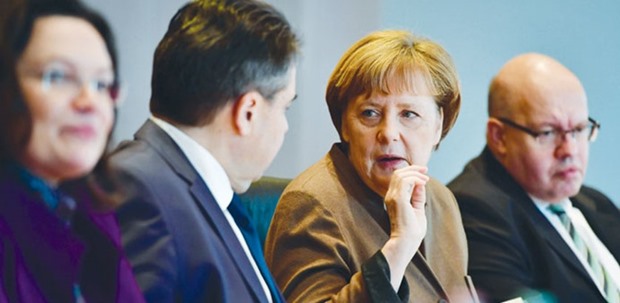Executive bonuses are turning into a campaign issue in Germany as the Social Democrats propose curbing manager compensation, putting Chancellor Angela Merkel’s bloc on the spot seven months before national elections.
Legislation presented by the SPD, Merkel’s junior coalition partner, would oblige shareholders to cap executive pay in relation to average employee pay and limit tax deductions for corporate officers to the first €500,000 ($525,300) in total compensation, party caucus head Thomas Oppermann said in Berlin yesterday.
With Merkel’s caucus divided, the Social Democrats are pushing a theme that appeals to core voters as they seek to extend a poll bounce ahead of the election on September 24. Martin Schulz, the SPD challenger who has narrowed the gap to Merkel’s Christian Democrat-led bloc, took aim in his nomination speech in January at managers who “rake in millions in bonuses” while checkout cashiers, he said, are fired for minor lapses.
Managers “are making 50 and sometimes even 100 times more” than average workers, compared with 15 to 20 times at the time of Germany’s economic recovery after World War II, Oppermann told reporters. “I don’t see that the performance of managers in comparison to employees has improved that much.”
Calls to rein in executive pay, an idea that has broad support in Germany, may help the SPD in its campaign to deny Merkel a fourth term. While the Social Democrats are broadly united and say they’ll seek to push the measure through parliament before the election, members of Merkel’s business wing are voicing reservations.
Peter Altmaier, Merkel’s chief of staff, told Bild am Sonntag newspaper that he supports proposals to use tax rules to damp manager compensation as long as “exorbitant” remuneration can’t be capped by law. He said he expects cross-party consensus for a bill in parliament.
Some lawmakers in Merkel’s caucus spoke up against such steps during a meeting in Berlin on February 14, according to a party official who attended. While Merkel and her parliamentary chief, Volker Kauder, signalled openness to the plan during the meeting, others rejected it as a violation of Germany’s economic order, said the participant, who asked not to be identified because the meeting was closed. No decision was taken at the gathering.
Support for Merkel’s two-party bloc held at 34% and the Social Democrats were unchanged at 31% in a Forsa poll for Stern magazine and RTL television published yesterday. That compares with an 18 percentage-point gap between Germany’s two biggest parties as recently as mid-January, though all national polls suggest Merkel’s bloc remains ahead. Forsa’s February 13-17 survey of 2,502 people had a margin of error of as much as 2.5 percentage points.

German Chancellor Angela Merkel (second from right) takes part in a weekly meeting of the German cabinet at the chancellery in Berlin yesterday. Executive bonuses are turning into a campaign issue in Germany as the Social Democrats propose curbing manager compensation, putting Merkel’s bloc on the spot seven months before national elections.
